Industry experts discuss the recruitment gateway
We ask the industry's leading experts what they think of the current recruitment gateway and what has to change…
Following an in depth discussion at The Superyacht Forum in Amsterdam on the lack of human capital in the superyacht industry, we decided to reach out to some of the industry's recruitment experts about the current gateway. The current model is not only very expensive, time consuming, and unreliable from the perspective of the individual being recruited, but it also doesn’t necessarily promote merited professionals. For this talking heads article we want to explore how the industry can make sure it will be able to hire the estimated 25,000 crew that will be needed by 2030. Is dockwalking dead? Is hanging around crew bars the best way to get a job? Should there be an apprenticeship scheme in place? We invite our readers to find the answers below and comment their thoughts…
Tim Clarke - Are apprenticeships the way forward?
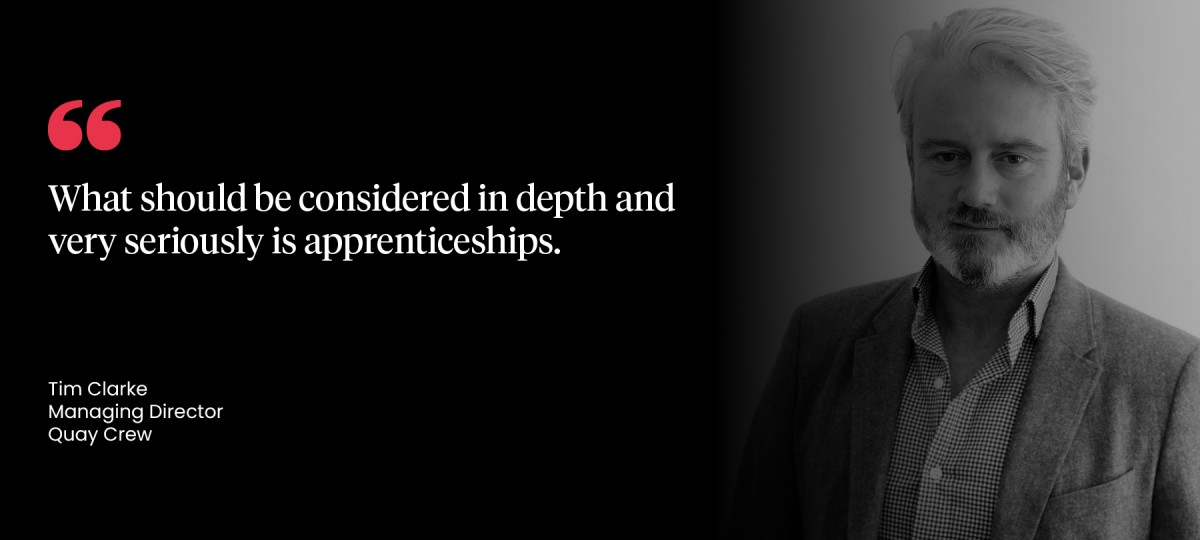
The dockwalking route into yachting has never been more difficult to achieve. Covid-aside, which has thrown up numerous travel and marina access restrictions, it’s simply not realistic for a young green crew member to support themselves financially while taking on the odd day job to gain experience. The social side of dockwalking can also encourage bad habits that are hard to shift once onboard! If they do get their first gig this way, in the current climate they will be very lucky.
What the yachting sector needs is, firstly, a different attitude towards green crew. Everyone was green once, many without those highly sought-after secondary skills. It’s true that some busy yachts just don’t have the time to train and support an inexperienced crew member, but there are plenty of yachts that do.
We should be encouraging new builds or refits to take on green crew during yard seasons, or operating yachts to recruit during quieter periods and delivering a proper induction process.
What should be considered in depth and very seriously is apprenticeships. Being a global sector with many different employment laws, it’s not without its challenges, but this type of training on the job packages would show that yachts are encouraging new entrants to the sector while giving green crew some peace of mind that they are actually heading towards a longer-term career and qualification. They would get paid less, yes, but it’s not cheap labour. Designed well, it could provide an excellent accredited way of bringing waves of new talent into the sector and improving crew quality and longevity – even reducing recruitment costs over time.
It might seem resource-heavy to take on green crew, but if yachts think about it, the above options would reduce the need to take on last-minute, unvetted and sometimes unreliable day workers or temp crew. Long term I’m sure it would save money and if the recruitment process was correct would reduce turnover long term.
Katrin Liefke - Have options available
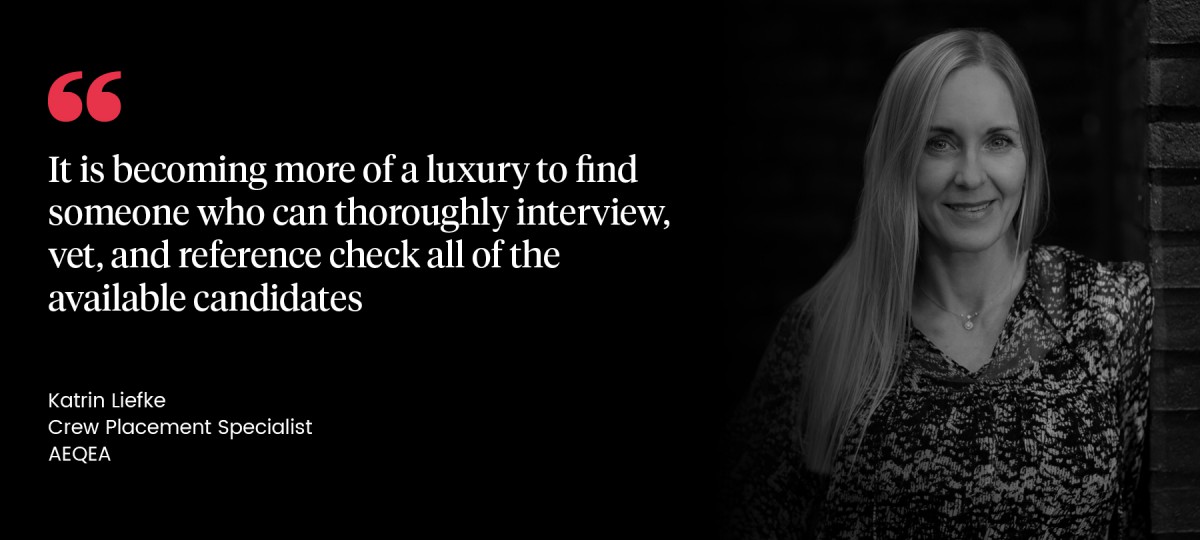
In today's age there exists a number of gateways into a yachting career for the typical green recruit with basic certification. Of course, walking the dock comes with its advantages as the recruit is present on site and readily available for daywork and interviews, however, this option is not always physically possible or even affordable to all.
In the digital age, one can make use of the various crew databases which are available and widely used by both captains and owners. The benefit of this is the broad exposure available immediately but those searching for recruits in these spaces must have the time to take the recruitment process into their own hands and filter through a multitude of CV’s in search for the ‘one’.
Others prefer to work with crew placement agencies such as ourselves who offer a service that helps interested parties understand a particular yacht and its specific requirements. Furthermore, it is becoming more of a luxury to find someone who can thoroughly interview, vet, and reference check all of the available candidates - an incredibly time-consuming task. From a young crew perspective, guidance is required to ensure that expectations are aligned ; Some boats are more ‘green’ crew friendly than others, and of course making the correct choice as a first yacht is immeasurably valuable. Having options available is a positive which only benefits the yachts and crew alike.
Feargus Bryan - Towards a more structured career path
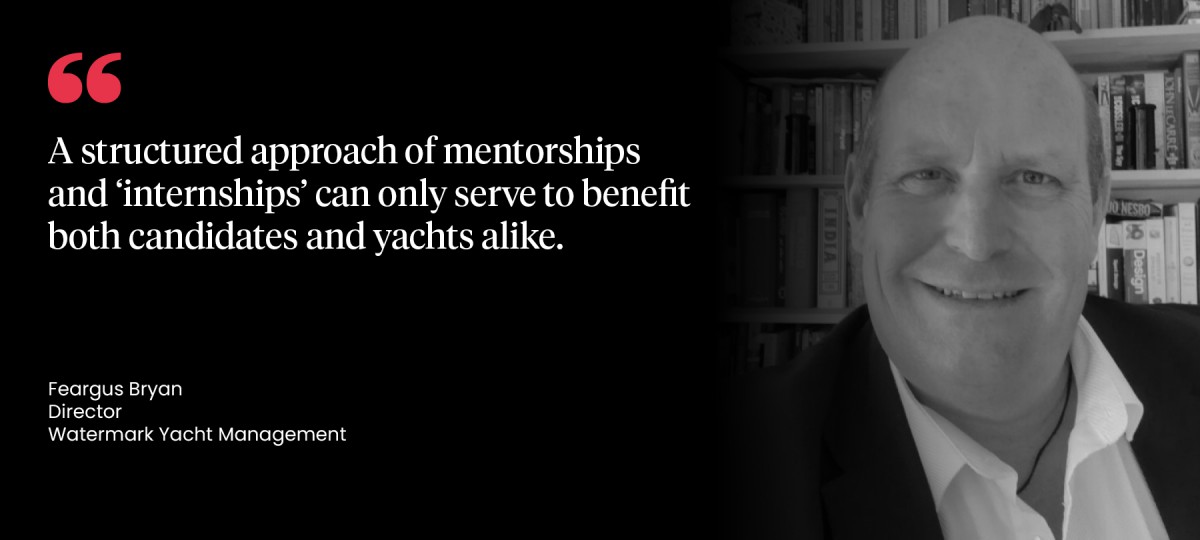
Yachting has grown logarithmically over the past 40 years from a relatively unregulated pastime to a professional multi billion dollar luxury industry. During this period, much needed structure has been implemented in many areas of the industry to underpin this growth but in other areas like entry into the industry, the change has been more organic. Now, with the need for good and experienced crew greater than ever, it is time to revisit the ‘gateway’ into yachting.
A structured approach of mentorships and ‘internships’ can only serve to benefit both candidates and yachts alike. This process gives a structured introduction into a career in yachting whilst giving the candidate that much needed first few months of experience on a yacht. It also provides the candidates with a positive entry experience into yachting which will provide the basis for long and successful careers. One of the issues at the moment is managing the career and employment expectations of young entry level candidates. Not dealing with this at an early stage can lead to high crew turnover and ultimately mental health issues, as well as disappointment on both sides of the contractual agreement.
Though there are plainly many captains who are already taking on and training ‘green’ crew when the situation allows, this practice should become more structured and formalised. A good first set of steps would be to create a formal framework around acceptance and training of green crew; recognition of the efforts of captains and crew that adopt mentoring and internship schemes on board. We also need more formal arrangements between crewing agents, yachts, and management to allow an internship scheme to operate. Once on board each new crew could be formally partnered with a mentor who has the responsibility of training them both in their job and the social and HR environment on yachts.
We can keep this attractive to young crew , it is a case of communicating and managing their expectations and entry into the industry.
Fiona Murray - Dock walking is dead
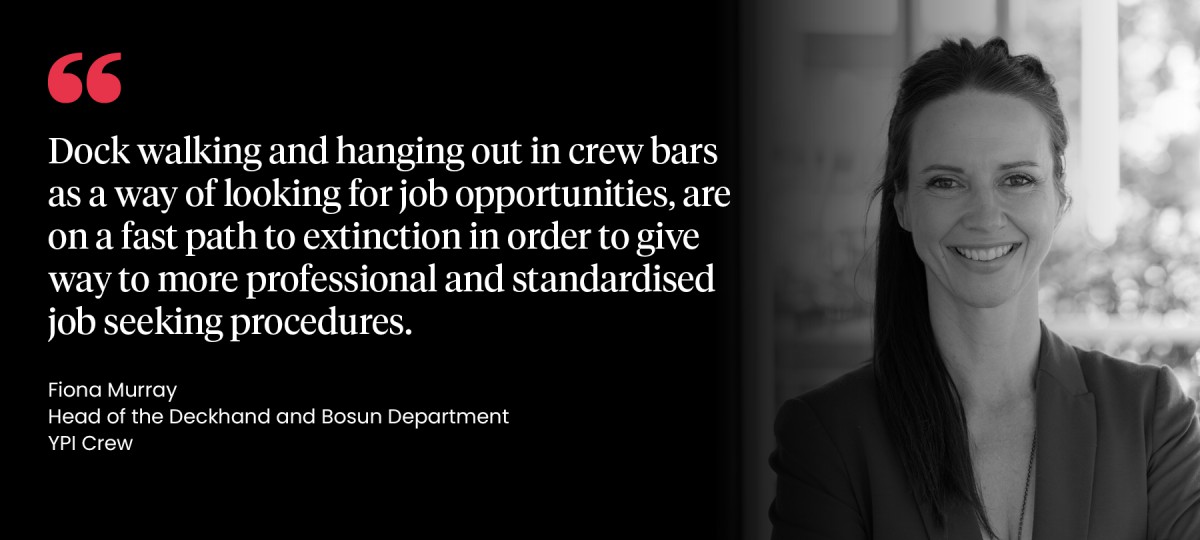
It’s safe to say that dock walking has been around for as long as the yachting industry itself. However, today we are indeed lucky to see that the industry has evolved away from one’s career being dependent on pounding the docks in the midday sun or frequenting the crew bars in hopes of chatting someone up for a job opportunity.
There are a number of avenues to finding a job as junior crew, and dock walking is certainly not at the top of the list. In fact, since COVID-19 started, some ports have even closed their doors to dock walkers in an attempt to provide safety to the yachts within. Brexit and the new legislation around it have been the nail in the coffin.
A fully-fledged deckhand newbie equipped with STCW (Basic Safety Training), Powerboat Level II, Seafarer’s Medical Certificate and PWC (Personal Watercraft certificate/jet-ski) should first and foremost spend their time putting together a great CV which highlights their transferable skills. After that, the next step is to sign up with a few reputable crew agencies who will accompany them in the quest for a job and champion them to get their foot through the door.
For junior crew, daywork still serves as a way to gain some experience and enter the industry, but how you go about securing daywork has changed since COVID-19. Once you have secured some daywork it does make it easier to place you as other industry peers can attest to your work ethic and this reassures future employers.
Another thing we would recommend is, COVID-19 permitted, flying out to one of the superyacht hubs such as Antibes and arranging a face-to-face interview with a recruitment consultant. Building a solid relationship of partnership and trust with a recruitment consultant is the key.
Another good way of connecting with the community is to stay in one of the crew houses, such as the Grapevine in Antibes as Captains will often call crew houses directly looking for day workers. We also recommend, where possible, upskilling yourself with courses such as the PWCI (Jet ski Instructor’s Course) or PDSD (Proficiency in Designated Security Duties) and investigating how to obtain a Yacht rating certificate.
For deckhands there are also a number of cadetships available. All these things will help junior crew land their first job in yachting and it shows that there are lots of options available today in order to help them break into the yachting industry.Dock walking and hanging out in crew bars as a way of looking for job opportunities, are on a fast path to extinction in order to give way to more professional and standardised job seeking procedures. In that context yacht crew agencies are leaders that will provide guidance to candidates looking to join the industry.
Margarita Amam - Recruit people with Grit
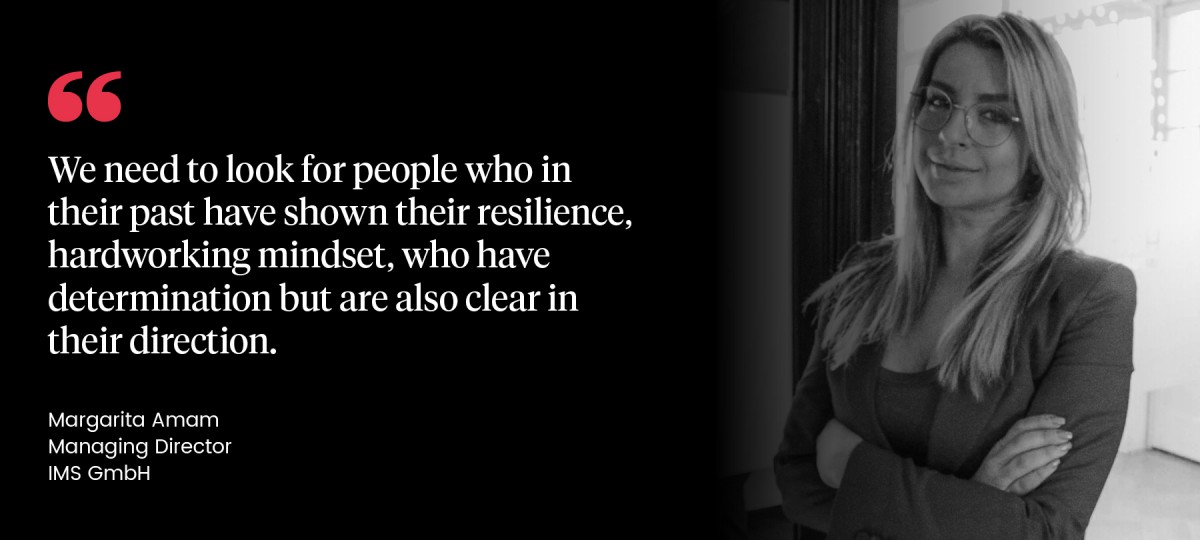
First of all there is no silver bullet for the issue(s) at hand, but there are a variety of solutions. Mistakes have been made in both the past and present and we have reached a point where treating the symptoms has become insufficient. The best opportunity to have addressed these issues has been and gone. The second best time is now.
We all observe the results of traditional mindsets on the human factor and the lack of support for pioneering ideas. Great talents have left and ‘the great resignation’ is evident globally, even in yachting. How do we counterweight or even resolve this?
For instant impact this industry would be advised to:
- Go to hospitality schools and hold career days
- Include schools & students from other countries outside the box of “The North European image/model”
- Headhunt from cruise ships, hotels, bars, spas etc. on land
- Start a collaboration with schools or hotel chains (sharing talent pool)
- Ask the right questions during the interview, look out for grit.
For longterm effects I suggest:
- Open a dialog and include crew, recruiters, managers, builders in the debate, allow for a flow of ideas first before shooting them down
- Create a safe space for effective exchange (e.g. anonymous polls)
- Trust is broken and needs to be mended not by hopes but with intentions (update company ethos, include ethical practices)
- Accept not being able to be the expert on everything and allow expert advice to be actioned
- Build a work- & living environment that professionalism can thrive and invest in talent on board as well as ashore
We need to accept that the world has changed and that we need to adapt to not just keep the order books but also the bunk beds full. The necessary goes beyond offering better salaries, it must include better working- and living conditions (refer to Maslow Pyramid). Treat others how you want to be treated (be honest about the employment, the good and bad sides) because you will only get as much as you are willing to give.
For those efforts to be long-lasting and effective we need to look for people who in their past (before yachting career) have shown their resilience, hard working mindset, who have determination but are also clear in their direction, with a combination of passion and perseverance - in short grit.
Otherwise we remain in the same cycle of asking the same 3 questions over and over again:
Why are people leaving the industry? Why are people not joining yachting? What would they find if they did join?
The answers to that are as easy as they are uncomfortable.
When we acknowledge why people leave we need to answer the question how to build a work & living environment so that the right ones stay.
Liam Dobbin- The Digital Future of the Yachting Industry
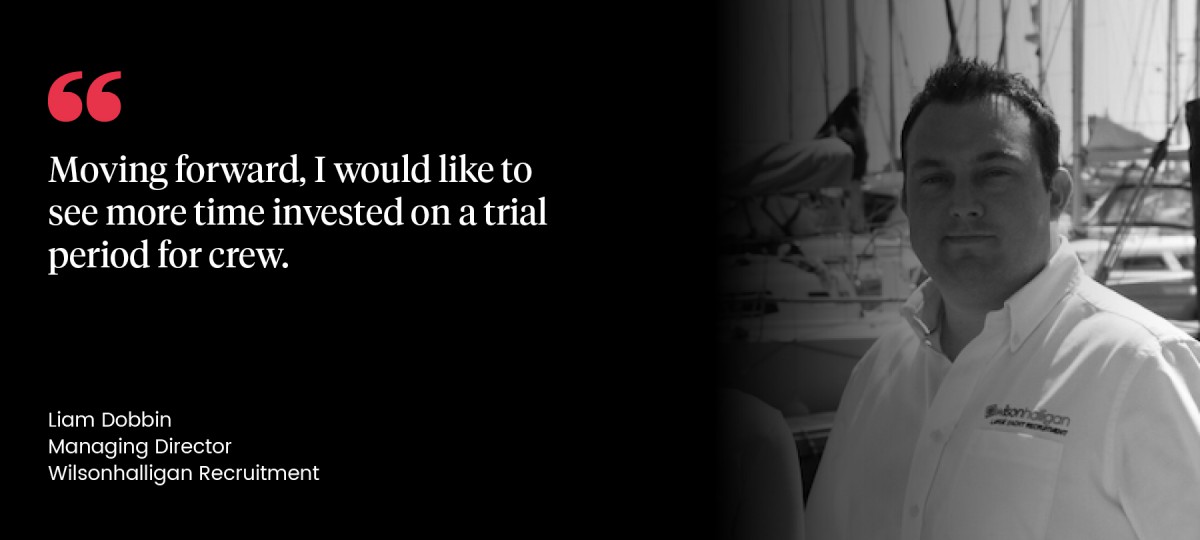
Let’s face it, the Yachting industry is not an easy one to crack. Getting your foot in the door in yachting can be a slog. If you’re brand new, day working is definitely the best bet — this helps them build some contacts and begin building yachting CV experiences. Getting in contact with different agencies and putting themselves out there as much as they can is a life changer. Finding day work does not only build up a candidate’s CV, but it also helps them get in touch with different people in the industry. Just a few days can definitely make a difference because the more work they can include on the CV, the more references they will have for future job applications.
Not only this, day working is a great way to learn what to expect in the industry. This experience is very important to green/new crew. It gives them the basics in what they need to expect. They learn detailing, following directions and responsibility. It shows a future employer that they are proactive and have some idea of what a daily job would be. More importantly, this shows an employer their capabilities, potential and how far they can go in the industry.
Moving forward, I would like to see more time invested on a trial period for crew. The boat giving them more training and management rather than just being let go without much of a chance for improvement.
One of the positives to come out of Covid is that we are now leaning more towards a digital approach of screening candidates. Doing video calls to interview and pre-screen a candidate can give us a more advanced opportunity to get to know them well. It will be interesting to see if this is here to stay shaping the future of yacht recruitment.
Feel free to join the conversation and comment below by signing up to the Essential Membership. Additionally, if you would like to contribute your thoughts on your chosen field of expertise, feel free to get in touch by emailing us on - hello@thesuperyachtgroup.com .
Profile links
Wilsonhalligan Yacht Recruitment
IMS GMBH - Interior Management Systems
NEW: Sign up for SuperyachtNewsweek!
Get the latest weekly news, in-depth reports, intelligence, and strategic insights, delivered directly from The Superyacht Group's editors and market analysts.
Stay at the forefront of the superyacht industry with SuperyachtNewsweek
Click here to become part of The Superyacht Group community, and join us in our mission to make this industry accessible to all, and prosperous for the long-term. We are offering access to the superyacht industry’s most comprehensive and longstanding archive of business-critical information, as well as a comprehensive, real-time superyacht fleet database, for just £10 per month, because we are One Industry with One Mission. Sign up here.
Related news

Built to discriminate
We speak to Margarita Amam from IMS GmbH about the adverse effects of poor interior design
Crew

Mentoring the next generation
Yachting’s first industry-wide mentoring programme, LEGASEA Mentorship will be launched in December
Crew
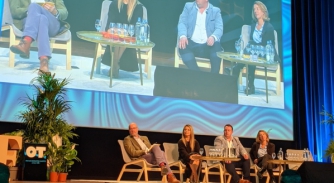
Superyachts in 2030 – The Next Generation
For the second session on the second day of TSF, we discuss the lack of human capital in the industry
Business

Analytics and recruitment for the brokerage market
SuperyachtNews speaks with Ed Ewer, managing director of Superyacht Recruiter, about the diverse opportunities across the industry
Business
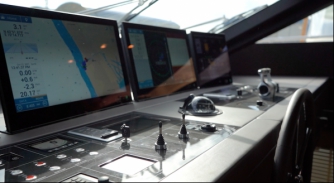
OT not IT (both)
Cyber discourse has been dominated by fears over IT hacks to the detriment of operational systems security
Technology
Related news
Built to discriminate
4 years ago
Mentoring the next generation
4 years ago
Superyachts in 2030 – The Next Generation
4 years ago
OT not IT (both)
4 years ago
NEW: Sign up for
SuperyachtNewsweek!
Get the latest weekly news, in-depth reports, intelligence, and strategic insights, delivered directly from The Superyacht Group's editors and market analysts.
Stay at the forefront of the superyacht industry with SuperyachtNewsweek



